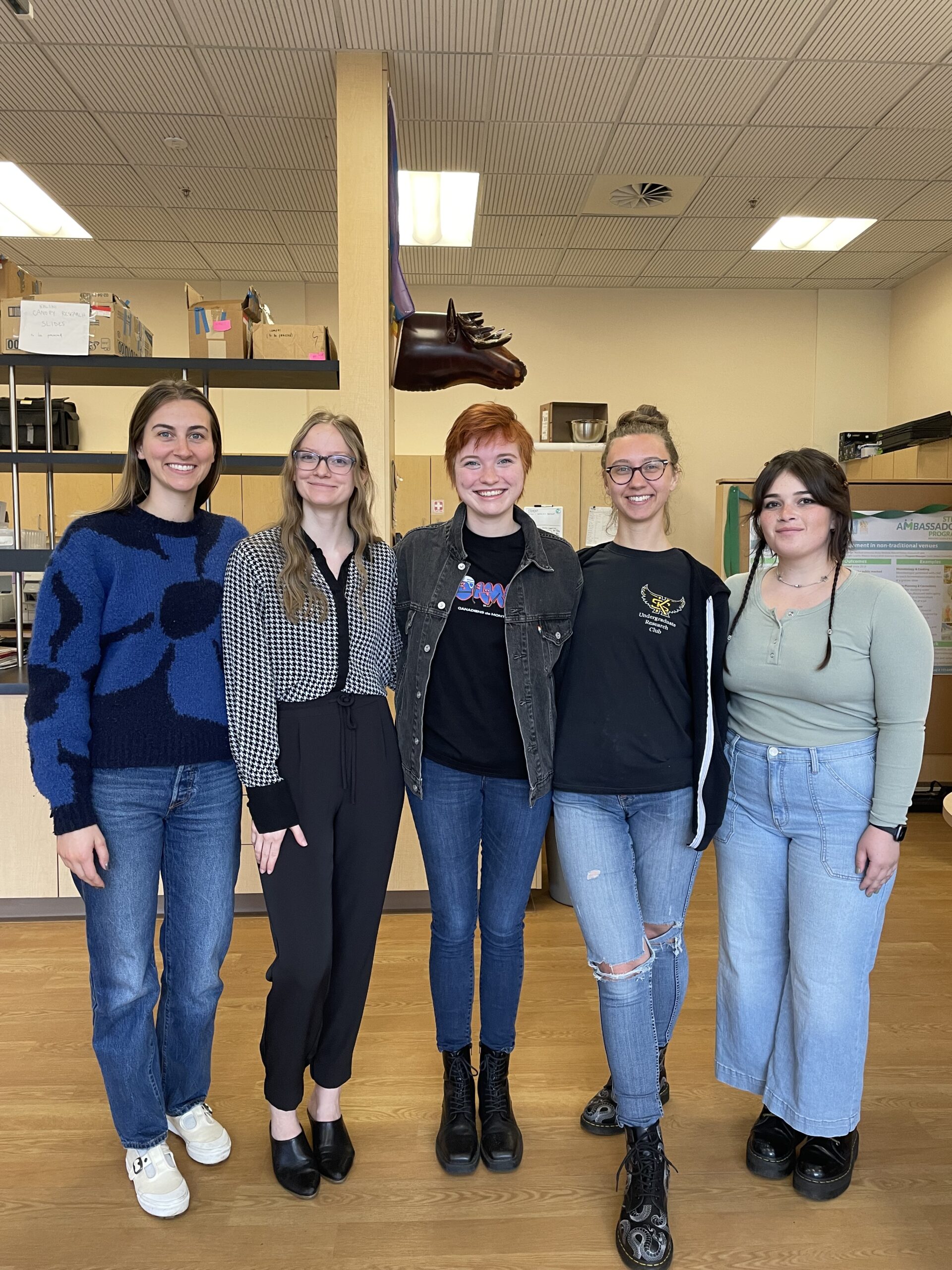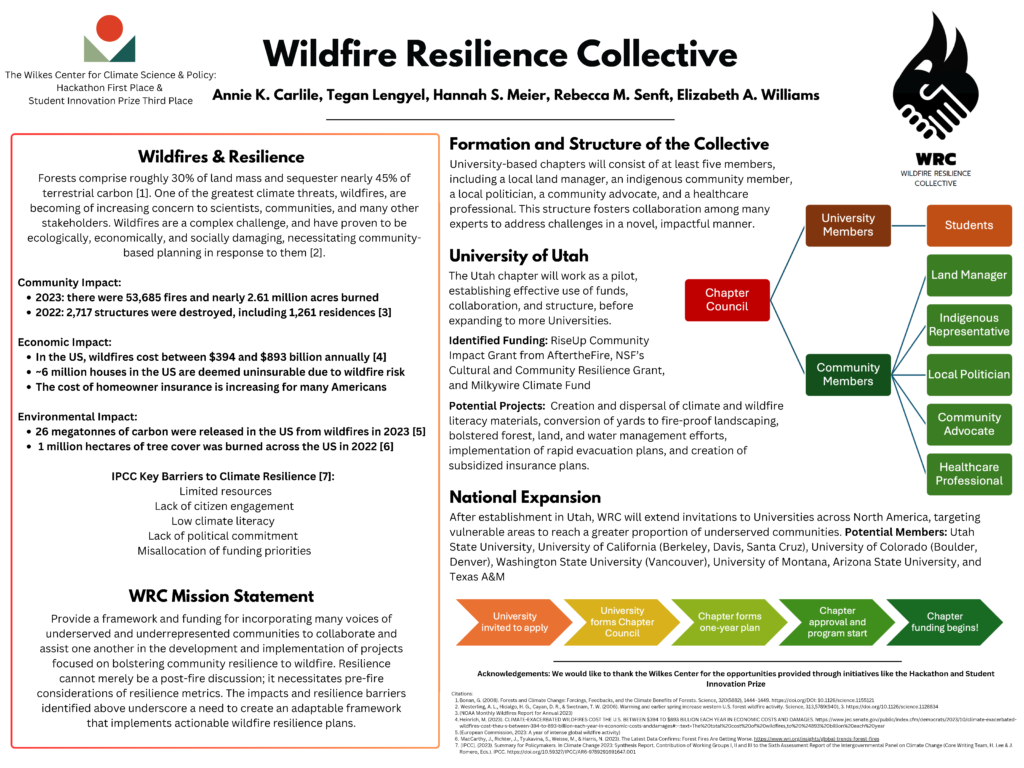
By Hannah Meier , PhD Student, School of Biological Sciences
Caption: [from left to right]: Tegan, a PhD student in the Anderegg lab, investigates the impact of climate change on forest biodiversity and carbon sequestration. Elizabeth Williams is an undergraduate biomedical engineering student with a keen interest in public health, having already conducted research in pediatric clinical health. I am also a PhD student in the DYCE and Reimer lab, exploring the repercussions of human-induced changes on the Great Salt Lake. Rebecca, a PhD student in the Aparecido lab, delves into the interaction between global change and invasive species. Recently, we added Annie Carlile to the team, a PhD student in the Bowling lab, interested in climate change’s influence on forest health, productivity, and fire susceptibility. We hope to continue expanding our team to make our vision of the Wildfire Resistance Collective a reality.
In January, my teammates and I dedicated 24 hours of our weekend to immerse ourselves in the pressing issues of wildland fire resilience in the West. Joining the Wilkes Center Climate Solutions Hackathon offered a valuable break from the routine grind of a first-year PhD student in biology. Our team's final project, establishing the Wildfire Resilience Collective ended up winning first place. however, the true highlight was the collaborative effort among students from various majors, urging us to tackle the issue from diverse perspectives and glean insights from each other.
Our team consists of PhD students from the Ecology, Evolution, and Organismal Biology in the School of Biological Sciences, and one undergraduate, a pre-med student studying Biomedical Engineering. The education and interests of each team member provide a wealth of foundational knowledge, but, most importantly, we share a common goal of utilizing our research to inform policymakers and stakeholders in shaping land use decisions, which motivated our participation in the Wilkes hackathon.
But what exactly is a hackathon? While often associated with coding challenges, its essence lies in rapidly developing solutions within a condensed time frame. Our team's focus was far removed from coding. We aimed to grasp the impact of wildfires on community resilience and the mechanisms behind fostering such resilience.
Central to our discussions were inquiries into the meaning of resilience, both in ecological and communal contexts. We landed on a definition of resilience as a community's or ecosystem's ability to absorb changes while maintaining established relationships, both within and across organisms.
 Our proposed solution to bolster community resilience post-wildfires revolves around establishing a novel chapter- based Wildfire Resilience Collective. This Collective aims to unite a diverse range of stakeholders, including local governments, universities, indigenous communities, health officials, and other affected parties. The primary objective of this coalition is to address the five key barriers identified by the Intergovernmental Panel on Climate Change (IPCC) for wildfire resilience: limited resources, insufficient citizen engagement, low climate literacy, lack of political commitment, and the imbalance in funding availability between mitigation and adaptation efforts. By integrating members from various segments of a community, chapters of the Collective will be united by the mission to tackle each of these barriers. Identifying funding streams (national and local) for the chapters will be incorporated into the mission and guidelines for the Wildfire Resilience Collective. By facilitating collaborative policymaking and community-centered scientific research, our initiative seeks to ensure that science is conducted with a community's best interests at heart, echoing the example set by many professors in School of Biological Sciences.
Our proposed solution to bolster community resilience post-wildfires revolves around establishing a novel chapter- based Wildfire Resilience Collective. This Collective aims to unite a diverse range of stakeholders, including local governments, universities, indigenous communities, health officials, and other affected parties. The primary objective of this coalition is to address the five key barriers identified by the Intergovernmental Panel on Climate Change (IPCC) for wildfire resilience: limited resources, insufficient citizen engagement, low climate literacy, lack of political commitment, and the imbalance in funding availability between mitigation and adaptation efforts. By integrating members from various segments of a community, chapters of the Collective will be united by the mission to tackle each of these barriers. Identifying funding streams (national and local) for the chapters will be incorporated into the mission and guidelines for the Wildfire Resilience Collective. By facilitating collaborative policymaking and community-centered scientific research, our initiative seeks to ensure that science is conducted with a community's best interests at heart, echoing the example set by many professors in School of Biological Sciences.
Following our success in the hackathon, our team is committed to founding the Wildfire Resilience Collective. After applying for the Wilkes Center Student Innovation Prize to acquire seed money for our project, we learned we tied for Third Place!
Our team and the other Hackathon-winning teams will showcase and discuss projects at the Wilkes Climate Summit in May. We aim to recruit additional members for the Utah-based chapter during this event, which will bring together professionals from various sectors interested in understanding climate change's impacts in Utah.
The Hackathon presents an incredible opportunity for students at the U to cultivate innovative and actionable ideas. While teams like mine, predominantly comprised of science, engineering, and math students, bring valuable perspectives, tackling complex issues, such as climate action, demands a diverse range of expertise. Historians, policy experts, entrepreneurs, communicators, and storytellers all play crucial roles in shaping solutions. As we conclude another successful Hackathon, I urge undergraduate and graduate students at the University of Utah to extend their education beyond the confines of the classroom. The Hackathon represents a great way to get engaged and contribute your skills.
Thank you to the Wilkes Center for Climate Science and Policy, to the University of Utah, and to the many donors who are looking to us, the students, to think creatively, learn, and find solutions to the challenges facing our planet.
Use this LINK to view the 2024 Hackathon projects. Interested in participating in a future Hackathon or submitting an idea for the Wilkes Center Student Innovation prize, you can learn more HERE.